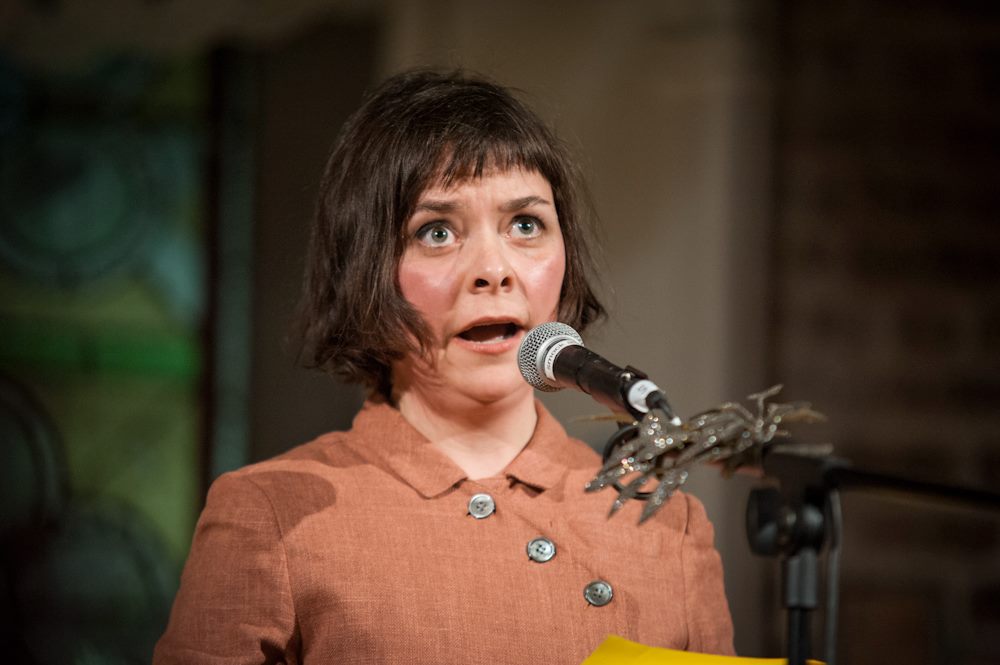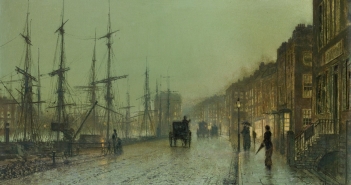Worthless. Humiliated. Deeply uncomfortable. Skin crawling. Awful. Shitty shit shitty fucking horror shit shit cock horror. Hate. Disdain. Awful, awful. Sad. Afraid. Unwelcome. Outside. Other. Ugly. Repulsive. Grotesque. Agnes. She wondered how, every time she appeared to be enjoying her time in Greenpoint. How, when things seemed like they were generally ok, she ended up with this gut-wrenching awareness that she was a gorgon who smelled of menstrual blood and dirty clothes.
Her old friend Derya is turning 25 and Agnes arrives at the apartment at the weird hour. The hour of semi-sobriety, of eyes open to who is coming and going at a party.
She heads for the punch before she attempts to talk to anyone. Everyone is preoccupied and ambivalent. The initial vague panic sets in. Agnes moves from the punch and rejoins the group with whom she arrived. Her husband Jen and Jen’s buddy, Martin. They’ve been hanging out all day at this stage. They drove in together. They ate BBQ together. Their day has already happened. She feels shame for having fought with Jen in front of Martin twice and was looking forward to getting away from the two of them upon arrival. As they have all run out of ways of making jokes or poking fun or having any kind of laugh together, there are a lot of silences and looking around. They have been hanging out for eight hours. Five of which involved a drive. How could they be expected to like each other at this stage. Jen tells a terrible story about drinking insane amounts of Red Bull in college and burning a wooden deer in a parking lot. Martin laughs hard even though Jen has told this story one hundred times and Martin was there when the event occurred. Agnes widens her eyes in disbelief and decides to brave the party room, thinking, I married a total asshole. She slams back her punch and ventures out for more, pressing down the mounting fear that builds within her.
There is a place Agnes revisits when a fissure appears in her emotional fabric. It’s buried deeply inside her heart. When she feels a certain way in a certain mood in a certain environment, it is back there she goes. It is a darkened cloak room in a Catholic school. St Pius X. It is a year after her father has died. She is 12 years old. She is confronted by a group of girls about her odour. She pretends to not understand that she does indeed stink. She pretends that her classmates are simply identifying her smell and trying to ‘help’ her in the same way that her condescending delusional mother tries to ‘help’ people on her case load as a social worker; only she knows these girls are meaner, because they are 12. They have not properly learned how to pretend to be kind just yet, or, they have not been properly trained in the art of transforming their dysfunction into judgement about other people’s pain. Professionally.
Party. Panic attack worsens.
The Dan Crowleys and Robert Roberges are plentiful in certain Brooklyn zip codes, at certain launches and parties. She is reminded of her station in life each time she visits this fucking place. Agnes epitomizes the very visible invisible. The wrong frame of mind and intrusive thoughts abound, corroding her ability to make the smallest conversational effort.
“So, what else…” falls out of her mouth, an involuntary verbal spasm. Stopping her. Turning her to melting, pointless garbage. She is so easily embarrassed by herself. Her own words, or lack of words in this case, cause her very innards to burn. Her mouth, dry now, presses its lips to the glass in her hand. She is reminded of a high school assembly when an alcoholic and a drug addict came to speak to her 11th grade class. She is standing near the punch table yet again, as she is reminded of this. Then she thinks of what the alcoholic hilariously stated was her past self-abuse motto. Agnes decides this is a great way to break the ice with the man to her left fumbling with cracker crumbs on his shirt. She conjurs her best raspy Rhode Island accent to re-enact the remembered phrase to the stranger. POOR ME. POOR ME. POUR ME ANOTHER DRINK. She says as she smiles at him, directing her eyes toward her glass in a knowing manner. He moves swiftly away from her, pretending to have heard nothing. Hey, do you have the time? She yells after him in an attempt to recover from the obvious rejection. Just then the host of the birthday party appears. Fucking finally. DERYA!! Says Agnes. Agnes. Says Derya. They hug and kiss. Some party! Says Agnes. Derya has to go check the stove. The moment of affirmation ends abruptly.
Astounding paranoia is the accomplice to this sorry state. Imagine someone walking through life wincing. That is an Agnes smile. That. All the time. Her husband, Jen, does not understand why she gets mad about things that are of no great importance. Why she feels affected by the slightest discomfort. Why her twinkle is infrequent. A callus formed over time. A hardness. A protective layer. And when a crack appears it reveals a heartache so great, no person could take it. She tries to keep it to herself. And sometimes at a gathering here or there her oddness takes hold. Her choking self-hatred rears its head, and she runs out of her external self. Her inner life surfaces, paralysing her. Reminding her of the collective experiences that have corroded her spirit. A lack of kindness can erode a person. Cause them to burn alive. Faces red from embarrassment. Faces red from too much wine. The tale is worn and it ages, as pain will. It wears through the skin. Hardship surfaces. It becomes apparent eventually.
Smell.
Agnes stands by the punchbowl and the peanuts and cheese and crackers, and reckons she is really quite okay with talking to nobody. Her inebriation is nearing wistfulness: in the company of old friends, she is forced to remember old friends. She remembers the cloakroom confrontation after prayer group with the Shultz family. George and his very religious mother, Ellen. She smells her sweater the entire way to the cloakroom. They all know she smells. So does she. She says goodbye and scurries away from them, and pretends she lives in the house next door to where she actually lives. The beat up old mansard hellhole. When they walk away, after she’s hidden in a backyard bush, and once the coast is clear, Agnes moves over to the apartment building she actually lives in. On the second floor. Where a dachshund named Boru has led the other creatures in a revolt involving copious amounts of waste on unread newspapers. The floor is regularly soaked with piss and shit, so much so that there is now no way of getting the smell out of the wood. Toxic and right outside her bedroom door. She climbs the apartment stairs, goes to the kitchen and toasts two bagels. She then smothers them with Philadelphia cream cheese and moves to the living room to sit down on the blue recliner purchased for her dying father and watch Gargoyles. A cartoon about gargoyles. Something stirs within Agnes. She gets up and goes into her older brother Stephen’s room. Has a look around. It smells like teenage boy. She goes to the kitchen and grabs a pile of papers. She re-enters Stephen’s room, places the Providence journal on the floor and pulls down her pants and takes a shit.
This party is hilarious, Agnes slurs to Martin. Martin nods. He is a quiet person. Martin. Have you seen my purse? I just had it. Have you seen it? I just had it. I just had it. Where’s Jen? I want to put my new lipstick on. I want to. Oh Martin, let’s play that game where we look around at every appalling person at a party and decide if they would be a Nazi or a member of the Resistance. Where’s Jen, says Martin.
Booze is a noose around our Agnes’ neck. A boring old piece of fraying rope that used to have a pleasant function. That rope was once integral to a tyre swing placed over a river. It wore down over time and has been left in a pile of leaves. To rot. Agnes picked it up. She made a knot. That ancient rope around her neck. Alcohol. A misused piece of rope. That once held a tyre and simple pleasure that is now a shabby lariat looking for a lighting fixture.
Agnes has found herself a party stranger to talk to momentarily while Martin rubs Jen’s shoulders. Long drive my ass she thinks to herself. Oh me? I’m just down visiting. I’m here for Derya. You know? Quarter of a century the old gal…anyway. What do I? I work in a deli called Hudson St., we make grinders. That’s what we call sandwiches in Rhode Island. Have you ever had an Italian? GRINDER. Italian Grinder? Ahahaha. What is wrong with me? AHAHHAHA. It’s funny. You’re not laughing. An Italian grinder consists of provolone cheese, capicola (pronounced like this: gabeegole), oh you’ve seen The Sopranos? Well there are a lot of Calabrese and Sicilians in Providence. Ahem. So, what else… salami, boiled ham, lettuce, tomato, red onion, oil and balsamic on the bread and oh no go right ahead. I have to go to the bathroom, too. No you go first. You work in a magazine. I’m better at holding my pee in. AHAHAHAHAAHA!!!! You know. Well, lunch rush has taught me a thing. It was nice meeting…She is now standing alone trying to look unbothered by the fact that she thinks, where did I put my glass? It’s in my hand. More liquid. More liquid it is. I would drink toilet water if it had a splash of vodka in it. Look at me.
There were these games. These games that they would play at St. Pius the X. The 12 year olds. These old games that they were too old to play imbued with new meaning. She understands them. Too old was she. There were no playmates any longer. Games meant so much more when you understood that you were a fat girl with braces and a wen on your nose. Games were meant to humiliate if you were not a pretty little figure. BUT HOPE. SWEET HOPE. Laughter. Kinship. Joy. She jumps in. Red rover, red rover let Agnes come over. RED ROVER RED ROVE’R LET AGNES COME OVER.
There are seven of her classmates in a row. Holding hands. Creating a chain. She runs right for the hot spot, at the boys she hopes to astonish with her comedic genius thus winning friendship from them and respect from the rest of the class. Ryan Roberge and Daniel Crowley. She runs in SLOW MOTION screaming HEEEERE IIII COOOMMME. She should of added YOUUU STUPID MOTHHHHERFUCKERRRS. That was one of those verbal expressions of frustration that came later in life accompanied by the finger when someone overtook her on the highway. But alas she was a reasonably good-natured 12. In the absence of resolution to childhood trauma the world is a rage canvas. Oh you stupid motherfuckers. Agnes runs in slow motion and she slowly breaks through with everyone laughing. Victory!! Victory, she thinks, until she realises that Crowley and Roberge pretend to have broken arms almost before she gets to them. As she pierces through their false union with all her husky hope that crushing feeling envelops her. She is the joke. The joke on TOP of her fucking joke. Extra funny. The game is for the other children soon to be teenagers gaping at one another. That game of breaking the flesh gate is for them at that moment. They get to play a child’s game all but for the chance to touch in front of the lay teachers.
There is an extra benefit to humiliating one tubby fool. The moment keeps recreating itself for the entertainment of the other children. They played that game of Agnes breaking arms for 30 minutes that day, and 30 minutes the next. And the next. And the next. It was just so funny, and then the joke got old. She was the rerun of a live sitcom for the week. Agnes didn’t stand up in frustrated defiance against her peers. She just let the pain of every recess wash over her, and then it stopped one day. Something else replaced it.
No such thing as victory. Life’s beauty is reserved for the beautiful. Is it possible to be that child and then become a proper, fully-formed adult? She feels more kinship with pigeons than she does her fellow man. That’s why she has found herself outside Derya’s birthday party. On the fire escape, watching from above as some hammered suit flings change at cabs. Agnes glasses him.
Moira Brady Averill (1983–2016) was a writer, comedian, and self-described “career waitress” from Providence, Rhode Island. She married a Dubliner, the composer Gareth Averill, and became a central figure on the offbeat fringes of Ireland’s comedy and theatre scene. For the Tiger Dublin Fringe festival she co-wrote and performed the shows Very Rich Hours and Flemish Proverbs, which won the award for Best Design in 2015. She created and MCed the script-tearing variety night Meat Scandal, and through the collective Change of Address she collaborated with artists in direct provision. Alongside her comedic work, Moira left behind many pieces of short fiction of a more serious tone, in varying states of completion. ‘Westerlywind’, in which her recurring semi-autobiographical anti-heroine Agnes goes to a birthday party in Brooklyn, is one such piece.




